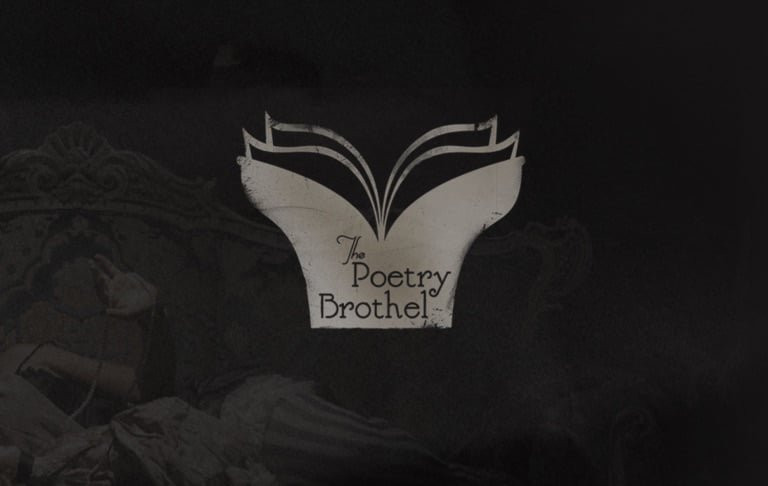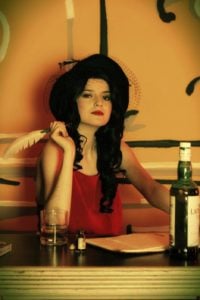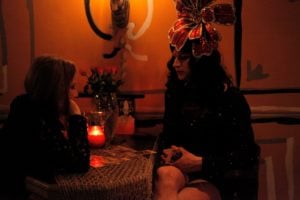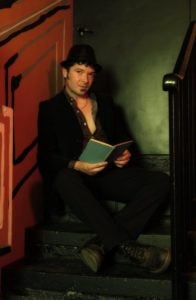Meet The Whores: We talk to one of the performers behind Poetry Brothel London
July 22, 2016
 Having recently caught the scent of a fresh ‘immersive poetry’ affair around town, I sat down with Annie Hannan-Smith (AKA ‘Le Chausseur’) to find out more about the Poetry Brothel.
Having recently caught the scent of a fresh ‘immersive poetry’ affair around town, I sat down with Annie Hannan-Smith (AKA ‘Le Chausseur’) to find out more about the Poetry Brothel.
Firstly, tell us a bit about poetry brothel. How long has it been going? How long have you been under their banner? What does it mean to you?
The Poetry Brothel hosts immersive poetry nights with a rotating cast of poets operating as ‘whores’, available for sequestered readings at any time, for a small fee. I joined the team just after its launch night in London this year.
My identity when performing there is a character that I have christened ‘Le Chasseur’. I’m a woman operating behind a masculine title. It’s partly a heavenward nod to the countless female writers forced to do that in the past. And a reminder that we aren’t necessarily defined by anything, especially names, that we are often paradoxical creatures.

Annie Hannan-Smith, The Poetry Brothel London. Photo: Tania Olive
The events have got so much spirit. It’s sexy. It’s got grit. I’ve seen a lot of frustratingly lukewarm performances on my nights out around this city, and seen too many people bawling desperate but artistically lacklustre rhymes off a stage. That takes guts, I’m not denying, but the Poetry Brothel has guts in a unique way. It’s a literary and sensual ecotone where the worlds of artistic expression and sexual liberation rub shoulders. It’s a beautiful world to me.
Creating ‘Le Chasseur’, I was heavily inspired by a book by Matthew Beaumont, Nightwalking: A Nocturnal History of London, which documents the lost, the vagrant and the noctambulant people who lived under the light of the moon as much as (or more than) they did the sun. With a particular focus upon the throngs of writers and poets amidst it all. I relate with that deeply.
It’s interesting what you say about this kind of well thought out, immersive experience perhaps acting as a remedy of sorts to the lacklustre performances you witness out and about. Do you think that immersive poetry is a logical next step for the performance of poetry? Do you see this as a natural point in poetry’s evolution?
There are a few thoughts that I’ve kept close to my heart, as an artist, throughout my life. When I think about performances, I like to think of the finished product as ‘devised madness’. Good art comes from hard work, and often the most penetrating art is hard work that’s masquerading as an effortless thing. My definition of ‘madness’ in a creative context is simply extremely passionate feeling. I believe in genius – or, I have my own interpretation of genius, that I believe in – but it’s shallow and colourless without sweat or blood.
I’m like a slightly morbid child when I’m creating. My process tends to involve either enduring some madness-inducing incident personally, or picking up and playing with whatever form of madness is within reach of my twitchy little fingers. In this era, most things are. We’re very ‘connected’. On a superficial, technological level. I stand by poetry being a lifestyle. True poetry. And immersive experiences like the Poetry Brothel are giving that some recognition. While madness pervades our lives, our job is to twist it into a structure of our own, to reproduce it with fresh bones wrought from words – and spaces, or silence, in the right places.
 ‘Immersive poetry’ is not a recent idea but it’s got reason to start blossoming now more than ever. I’m determined to be a part of that task. But it’s difficult, I find, to get a grasp of what my brand of audience is – my personal demographic – and what demographic has the power or volume to define the course that performance poetry takes. This is where the way its future is shaped differs from that of poetry written for the page. One rather tragic tradition, in literature and especially poetry, is authors producing incredible work that gets ignored or shunned for fifty years or more. Which then explodes in popularity once they’re dying in a gutter, or already in their grave.
‘Immersive poetry’ is not a recent idea but it’s got reason to start blossoming now more than ever. I’m determined to be a part of that task. But it’s difficult, I find, to get a grasp of what my brand of audience is – my personal demographic – and what demographic has the power or volume to define the course that performance poetry takes. This is where the way its future is shaped differs from that of poetry written for the page. One rather tragic tradition, in literature and especially poetry, is authors producing incredible work that gets ignored or shunned for fifty years or more. Which then explodes in popularity once they’re dying in a gutter, or already in their grave.
Before I began to perform my poetry – I was just under 17 when I took it to the stage, or mainly, to odd bars and pubs I could find – I wasn’t thinking too hard about exposure for what I wrote, precisely because of what history appeared to dictate: disappointment. I was a little more cynical then. And quite often enjoyed being a lone wolf as a child – felt powerful in a lone wolf’s skin. This old trait still defines a lot about me now, and my attitude towards art as an industry.
We’re watching some interesting but often depressing things happening to the music industry now. There’s a lot of corruption and strange agendas in that world. And annoyingly, there are too many submissive artists out there accommodating a select few’s ideas about how their art can be sold. I think anybody drawn to poetry is aware that it is in poetry’s nature to resist slavishly allowing that. It’s poetry’s nature to want to derail that sort of thing. Poetry tends to exist outside the grid. People often confuse this with esotericism I think, which is wrong.

Lazarus McCarthy, The Poetry Brothel London. Photo: Tania Olive
Poetry is very much accessible! It’s just not being spoon fed to people. I think a wider range of people are finally going to warm to that vibe and start picking up the aforementioned spoon for themselves once they realise how incredible immersive poetry experiences are, and how incredible they’re going to be once interest has escalated even more in future. I think immersive performances can provide an exciting gateway for people to become more engaged with poetry, without compromising the nature of it. I hope that’s the way it rolls out. I’m bored of people saying “I thought poetry was dead” after asking what I do in my life.
The immersive element of it means we get to incorporate many more elements of theatre. It’s what we are doing at the Poetry Brothel. It gives the arts, collectively, a platform where we have the ability to cross-pollinate, which is delightful. The Poetry Brothel involves live music, burlesque dancers, painters and fortune-tellers, with newly integrated themes, performances and installations at each event.
Could this immersive element be the feature of all/ any new artistic performance that makes it truly of our time?
I wouldn’t go that far. It’s not quite for everybody. Which isn’t a negative thing, it’s just reality. In fact, the immersive element would clash with some styles horribly – undermine them. Take Brecht, for instance, and Epic Theatre conventions like verfremdungseffect – the whole point of which is to stop the audience having any delusion that they’re witnessing something real. It’s not about the imitation of reality, it’s purely presenting ideas.
We need to be thinking about what artistic forms and styles have carried us through history, how things are changing now, what other things are demanding people’s regard, and how can art seize it back. Nothing’s going to do it singlehandedly. Art needs variety, so that it continues to cater for all the variations in us humans. There’s never one thing that defines our time, and that truth is something beautiful.
Is there something about your style that suits Poetry Brothel, or do you ever think about changing what you do to fit it, when it’s on?
I think that if I had to ‘try’ – if I had to change my style – to suit the Poetry Brothel, I wouldn’t belong there! In general life, I consider myself rather a chameleon, and that chameleon quality is present in my work. It contains a lot of different energies. But I think the primary energy that I am conducting at any given time is very much aligned with what I channel in my performances at the Poetry Brothel.
Find out more about the Poetry Brothel here. Catch Annie performing next at ‘Secret Tea & Fantasy’, a similarly collective event involving musicians, poets, comedians, dramatists, this Sunday at 4:30pm at The Slaughtered Lamb.

Comments